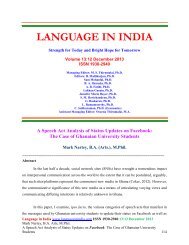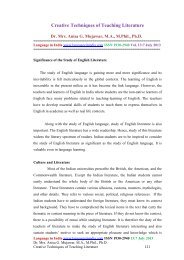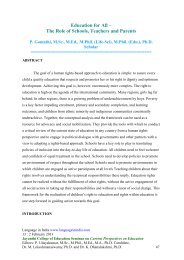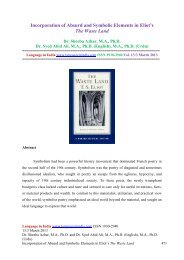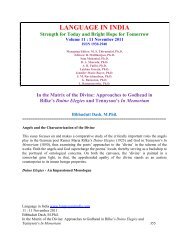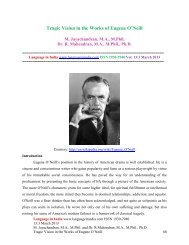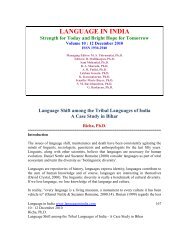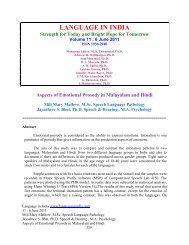PORTRAYAL OF MIDDLE CLASS WOMEN IN BAPSI SIDHWA'S ICE ...
PORTRAYAL OF MIDDLE CLASS WOMEN IN BAPSI SIDHWA'S ICE ...
PORTRAYAL OF MIDDLE CLASS WOMEN IN BAPSI SIDHWA'S ICE ...
Create successful ePaper yourself
Turn your PDF publications into a flip-book with our unique Google optimized e-Paper software.
LANGUAGE <strong>IN</strong> <strong>IN</strong>DIA<br />
Strength for Today and Bright Hope for Tomorrow<br />
Volume 12 : 7 July 2012<br />
ISSN 1930-2940<br />
Managing Editor: M. S. Thirumalai, Ph.D.<br />
Editors: B. Mallikarjun, Ph.D.<br />
Sam Mohanlal, Ph.D.<br />
B. A. Sharada, Ph.D.<br />
A. R. Fatihi, Ph.D.<br />
Lakhan Gusain, Ph.D.<br />
Jennifer Marie Bayer, Ph.D.<br />
S. M. Ravichandran, Ph.D.<br />
G. Baskaran, Ph.D.<br />
L. Ramamoorthy, Ph.D.<br />
Assistant Managing Editor: Swarna Thirumalai, M.A.<br />
Portrayal of Middle Class Women in Bapsi Sidhwa’s Ice-Candy Man<br />
During the Catatonic Times of Partition<br />
N. Gunasekaran, M.A., M.Phil. and V. Peruvalluthi, Ph.D.<br />
==================================================================<br />
Abstract<br />
http://www.bapsisidhwa.com/<br />
The women characters "subtly but effectively subvert the ingrained elements of<br />
patriarchy, privileging female will, choice, strength along with the feminine qualities of<br />
compassion and motherhood” in Ice-Candy-man which can undoubtedly be termed as a<br />
feminist novel - the traditional novel eulogizes the heroic qualities of men, while in feminist<br />
Language in India www.languageinindia.com<br />
12 : 7 July 2012<br />
N. Gunasekaran and V. Peruvalluthi, Ph.D.<br />
Portrayal of Middle Class Women in Bapsi Sidhwa‟s Ice-Candy Man during the Catatonic<br />
Times of Partition 187
narratives women acquire such attributes by their active involvement in and control of<br />
situational contexts.<br />
Lenny, the narrator in Ice-Candy-Man is also the centre of the novel, retaining her in-<br />
dependent identity in diverse situations. Her attitude towards her nameless cousin<br />
significantly portrays the feminist need for assertive equality. Lenny, the child narrator of the<br />
novel, witnesses the barbaric cruelties of the Partition days, including the inhuman<br />
commoditization of women. Yet what emerges as the dominant note or thematic motif in the<br />
novel is not the victimization of women, but their will and sustained effort to fight against it<br />
and overcome it.<br />
Most of the other Partition novels in English have concentrated largely on the<br />
helplessness of women pitched against oppressive male forces. Khushwant Singh's Train to<br />
Pakistan, and Manohar Malgonkar's A Bend in the Ganges, highlight the trauma women had<br />
to undergo during the catatonic times of Partition.<br />
The Woman Characters<br />
The women characters of Ice-Candy-Man draw our attention to the facts of<br />
victimization of women and their being forcefully compelled to define their lives according<br />
to the pre-fixed gender roles. They also expose the patriarchal biases present in the<br />
Language in India www.languageinindia.com<br />
12 : 7 July 2012<br />
N. Gunasekaran and V. Peruvalluthi, Ph.D.<br />
Portrayal of Middle Class Women in Bapsi Sidhwa‟s Ice-Candy Man during the Catatonic<br />
Times of Partition 188
archetypal social perceptions. Lenny, the child protagonist, recognizes these social patterns<br />
and exhibits the vivacity to transcend them. She also records the multi-faceted trauma women<br />
had faced during the unsettling and devastating days of Partition.<br />
Original title: Ice Candy Man<br />
Ice-Candy-Man has strong women characters who want discriminatory action against<br />
women stopped, and emphasize on conditioning them for life-long and speak against willing<br />
subjugation to men; the women of Ice-Candy-Man are not only conscious of their desires, but<br />
also eagerly assertive about their independent handling of situations.<br />
Subversion of Patriarchy<br />
The women characters "subtly but effectively subvert the ingrained elements of<br />
patriarchy, privileging female will, choice, strength along with the feminine qualities of<br />
Language in India www.languageinindia.com<br />
12 : 7 July 2012<br />
N. Gunasekaran and V. Peruvalluthi, Ph.D.<br />
Portrayal of Middle Class Women in Bapsi Sidhwa‟s Ice-Candy Man during the Catatonic<br />
Times of Partition 189
compassion and motherhood.” Ice-Candy-man can undoubtedly be termed as a feminist novel<br />
- the traditional novel eulogizes the heroic qualities of men, while in feminist narratives<br />
women acquire such attributes by their active involvement in and control of situational<br />
contexts.<br />
Lenny, the narrator in Ice-Candy-Man is also the centre of the novel, retaining her in-<br />
dependent identity in diverse situations. Her attitude towards her nameless cousin<br />
significantly portrays the feminist need for assertive equality.<br />
The Essential Nature of Feminist Writing<br />
At this point it should be interesting to note that all women's writing may not be<br />
necessarily feminist. A piece of writing which justifies, propagates or perpetuates<br />
discrimination against women cannot be termed as feminist. Only that artistic work, which<br />
sensitizes them to forge their independent identity in a patriarchal set-up which essentially<br />
exposes to the readers the practices of subjugation, and opposes them, can be treated as being<br />
feminist in nature.<br />
Ice-Candy-Man not only sketches and critically reviews the dehumanizing patriarchal<br />
norms engendering a discriminatory social climate, but also portrays the struggles against<br />
them, as well as the desire to manifest an assertive self-will, on the part of its women<br />
characters.<br />
Focus on Will and Sustained Effort of Women<br />
Lenny, the child narrator of the novel, witnesses the barbaric cruelties of the Partition<br />
days. Yet what emerges as the dominant note or thematic motif in the novel is not the<br />
victimization of women, but their will and sustained effort to fight against it and overcome it.<br />
Most of the other Partition novels in English, as well as in other languages, have<br />
concentrated largely on the helplessness of women pitched against oppressive male forces.<br />
Khushwant Singh's Train to Pakistan, Manohar Malgonkar's A Bend in the Ganges in<br />
English, and the short stories of Saadat Hasan Manto and Kishan Chander in Urdu highlight<br />
the trauma women had to undergo during the catatonic times of Partition.<br />
Language in India www.languageinindia.com<br />
12 : 7 July 2012<br />
N. Gunasekaran and V. Peruvalluthi, Ph.D.<br />
Portrayal of Middle Class Women in Bapsi Sidhwa‟s Ice-Candy Man during the Catatonic<br />
Times of Partition 190
Even the more contemporary authors have not been able to escape it. They have talked<br />
about the national trauma of Partition using the device of the child narrator and taking the<br />
linear time narration.<br />
Clever Juxtaposition – Portrayal of Lenny<br />
Sidhwa, on the other hand, treats the theme of Partition with a clever juxtaposition of<br />
images and an underlying ironical humour without compromising the innate independence of<br />
women.<br />
Lenny perceives many differences in the personality traits and interests of men and<br />
women. However, Lenny is neither influenced nor conditioned by her perception of gender-<br />
based social stereotypes—that she assertively retains her interests is evident in her attitude<br />
towards her Ayah, Hamida and her cousin. When godmother arranges a meeting with Ayah,<br />
Lenny insists on accompanying her. She feels that Ayah has been wronged and shamed by<br />
her friends and she shares her humiliation. She wants to „comfort and kiss her ugly<br />
experiences away.‟ She does not think that sexual exploitation should remain a stigma for any<br />
woman, "I don't want her to think she's bad just because she's been kidnapped." She also<br />
keeps Hamida's past a secret under the impression that if revealed her mother may sack her.<br />
Her sympathy binds her to all the women characters in the novel.<br />
Through Lenny’s Eyes<br />
Through Lenny, Sidhwa vividly portrays Ice-Candy-Man's toes, Avail's furtive glances<br />
towards Sharbat Khan and the Masseur's intimacy with Ayah. Her relationship with her<br />
cousin, allowing her clandestine forages into physical intimacies, shows her<br />
mental independence. Despite the pressures of socially constructed gender-roles and<br />
expectations the awakening of an individuality which is present in Lenny can be felt in other<br />
women characters too. Lenny's mother belongs to the privileged economic strata of the<br />
society. She can engage several servants to look after the children and other daily chores. She<br />
is kept busy with her social obligations - entertaining guests and partying use up her time.<br />
Lenny's physical handicap has generated a sense of guilt in her which often surfaces in her<br />
conversations. She says to Col. Bharucha, "It's my fault, I neglected her—left her to the care<br />
Language in India www.languageinindia.com<br />
12 : 7 July 2012<br />
N. Gunasekaran and V. Peruvalluthi, Ph.D.<br />
Portrayal of Middle Class Women in Bapsi Sidhwa‟s Ice-Candy Man during the Catatonic<br />
Times of Partition 191
of Ayah." Lenny admires her delicate beauty, but resents her "all-encompassing"<br />
motherliness. She is initially possessive about her mother but soon learns to cope with it. Her<br />
mother's voluptuous appeal generates a subtle jealousy in her psyche:<br />
Motherliness<br />
“The motherliness of Mother....How can I describe it? While it is there it<br />
is all-encompassing, voluptuous. Hurt, heartache and fear vanish....The<br />
world is wonderful, wondrous - and I perfectly fit in it. But it switches<br />
off, this motherliness....” (42)<br />
Mother's motherliness has a universal reach. Like her involuntary female magnetism it<br />
cannot be harnessed. “I resent this largess. As father does her unconscious and indiscriminate<br />
sex appeal. It is a prostitution of my concept of childhood rights and parental loyalties. She is<br />
my mother - flesh of my flesh and Adi's. She must love only us!”<br />
Lenny is given ample personal space by her mother. Though decisively controlling and<br />
channelizing her children's lives, she allows them to frolic around and view life from their<br />
own standpoints. Lenny is permitted to accompany Imam Din twice to a village Pir Pindo,<br />
her visits to parks and restaurants with Ayah are also unchecked. She is also able to<br />
effortlessly control the entourage of servants and run her household smoothly. Despite her<br />
liberated handling of children and a modern life-style, she is very much a traditional wife,<br />
humouring constantly the wishes of her husband. She is almost servile in her attitude towards<br />
her husband, coquettishly appeasing him and trying to create an atmosphere of pleasant mirth<br />
around him. Lenny sceptically looks on when her mother chatters in saccharinely sweet tones<br />
to fill up the "infernal time of Father's mute meals."<br />
Inner Void – Social Grace as Pleasure and Bondage<br />
Though Lenny is not able to decipher it, her remarks hint at the presence of an inner void<br />
in her mother's personality. Most of the women writers have hinted at the presence of an<br />
inner hollowness in the lives of women, which is often shielded by the deceptively beautiful<br />
screen of their social graces and obligations. For women like Mrs. Sethi, social elegance is<br />
not simply a pleasure, but it is also bondage, because herein they are forced to accept their<br />
Language in India www.languageinindia.com<br />
12 : 7 July 2012<br />
N. Gunasekaran and V. Peruvalluthi, Ph.D.<br />
Portrayal of Middle Class Women in Bapsi Sidhwa‟s Ice-Candy Man during the Catatonic<br />
Times of Partition 192
ole as female. Lenny's Ayah Shanta is focussed upon in a serious manner. She is a Hindu<br />
girl of eighteen and everything about her is also eighteen years old. Though she is employed<br />
by considerate masters, her condition is that of an unprotected girl whom everybody treats<br />
only as a sex object. Looking at Ayah, Lenny also becomes conscious of her sexuality:<br />
“The covetous glances Ayah draws educate me. Up and down, they<br />
look at her. Stub-ended twisted beggars and dusty old beggars on crutches drop<br />
their poses and stare at her with hard, alert eyes. Holy men, marked in piety,<br />
shove aside their pretences to ogle her with lust. Hawkers, cart-drivers, cooks,<br />
coolies and cyclists turn their heads as she passes, pushing my pram with the<br />
unconcern of the Hindu goddess she worships.”(3)<br />
Sexuality<br />
While the sexuality of Lenny's mother lies beneath the veneer of sophistication and<br />
unfulfilled longings, Ayah's is transparent and self-serving. She is fully aware of her sexual<br />
charm and uses it without any inhibition to fulfil her desires. She has accumulated a good<br />
number of admirers who regularly assemble in the Victoria Garden - the Ice-Candy-Man, the<br />
Masseur, the Government House gardener, the restaurant owner, the zoo-attendant, and a<br />
knife-sharpening Pathan are her regular admirers.<br />
Charms of Ayah<br />
Ayah uses her charm to obtain easy gains - cheap doilies, cashew nuts, extra serving of<br />
food etc. She successfully uses her charm as a strategy of survival and manipulation till the<br />
violence of Partition destroys her familiar world. Her portrayal also represents the male<br />
exploitation of female sexuality. Ice-Candy-Man manages to kidnap her with the help of<br />
some hooligans and forces her into prostitution. Despite her conviction that she is now an<br />
impure person, she retains her will to go back to her family and face life anew. Her refusal to<br />
admit defeat despite physical and emotional mutilation, and her determination to probe into<br />
future alternatives impart to her a strong moral courage.<br />
Godmother and Slave Sister<br />
Language in India www.languageinindia.com<br />
12 : 7 July 2012<br />
N. Gunasekaran and V. Peruvalluthi, Ph.D.<br />
Portrayal of Middle Class Women in Bapsi Sidhwa‟s Ice-Candy Man during the Catatonic<br />
Times of Partition 193
Godmother and Slave sister - Rodabai and Mini Aunty - are other major female<br />
characters in the novel who are presented with a sense of glee. The one-and-a-half-room<br />
abode of her godmother is termed as her heaven by Lenny. She is also a surrogate mother for<br />
Lenny in a mutually fulfilling relationship. Her portrayal is presented to us by Lenny in a<br />
fascinated manner, as if she is an idolized entity. She is presented as an old lady, plainly<br />
attired in Khaddar saris, covering herself from head to foot, possessing a penchant for sharp<br />
wit, accurate repartee and a profound understanding of human psyche.<br />
She makes it her business to know everything about everybody, and tries to help people<br />
whenever she can. She donates blood, seeks admission to a boarding school for Ranna, traces<br />
the Ayah and manages to send her back to her people. She is also a formidable person, and<br />
scolds the Ice-Candy-Man for disgracing the Ayah, "Oh? What kind of man? A royal pimp?<br />
What kind of man would allow his wife to dance like a performing monkey before other<br />
men? You're not a man, you're a low-born, two-bit evil little mouse!" Despite Slave sister's<br />
protest she permits Lenny to accompany her to Ayah's place. She is also a sensitive person.<br />
When she realizes that Ayah, despite her marriage to the Ice-Candy-Man, does not want<br />
to live with him, she decisively sets about to rescue her. Her visit to the Ayah has the<br />
trappings of a trial: she sits and acts as a judge. Unlike other female figures of the novel<br />
Godmother has transcended her sexuality and emerges as an authoritative presence, able to<br />
achieve her desires. She embodies the ideal of strength in female characters.<br />
Other Female Characters in Ice Candy Man<br />
Other female characters are Muccho, the sweeper, and her daughter Papoo. Muccho<br />
takes Papoo as her rival and saddles her with all the household chores, beating and abusing<br />
her on the slightest of pretexts. Ayah and other servants constantly try to save the young child<br />
from this abuse but often their efforts are fruitless. Once she had to be admitted to hospital for<br />
two weeks as she had concussion as a result of her mother's severe beating. But despite this<br />
senseless maltreatment, Papoo cannot be browbeaten into submission. She is strong and high-<br />
spirited, but as Sidhwa suggests very early in the story, "There are subtler ways of breaking<br />
people."<br />
Language in India www.languageinindia.com<br />
12 : 7 July 2012<br />
N. Gunasekaran and V. Peruvalluthi, Ph.D.<br />
Portrayal of Middle Class Women in Bapsi Sidhwa‟s Ice-Candy Man during the Catatonic<br />
Times of Partition 194
Muccho arranges her marriage with a middle aged dwarf whose countenance betrays<br />
cruelty. Papoo is drugged with opium at the time of the ceremony to suppress her revolt.<br />
Lenny curiously studies Muccho's face during the wedding ceremony and is startled to find a<br />
contented smile on her lips. The sketch of Muccho suggests that women themselves are un-<br />
consciously bound by their conditioning and saddle their daughters with a repetitive fate,<br />
treating marriage as a panacea of all ills. The women characters of Ice-Candy-Man draw our<br />
attention to the facts of victimization of women and their compulsions to define their lives<br />
according to the pre-fixed gender roles. They also expose the patriarchal biases present in the<br />
archetypal social perceptions. Lenny, the child protagonist, recognizes these social patterns<br />
and exhibits the vivacity to transcend them. She also records the multi-faceted trauma women<br />
had faced during the unsettling and devastating days of Partition.<br />
==============================================================<br />
References<br />
Alter, Joseph. “Celibacy, Sexuality, and the Transformation of Gender into<br />
Nationalism in North India.” The Journal of Asian Studies 53.1 (1994):<br />
45-66. JSTOR. Web. 3 Nov. 2010.<br />
Baral, K. C. “Postcoloniality, Critical Pedagogy, and English Studies in India.”<br />
Pedagogy 6.3 (2006): 475-491. Project Muse. Web. 29 Oct. 2010.<br />
Brian, Paul. Modern South Asian Literature in English. Westport: Greenwood<br />
p. 2003. Print.<br />
Kumar, Sathish. Dr, A Survey of Indian English Novel. Bareilly:<br />
Prakash Book House, 2006.<br />
Sidhwa, Bapsi, Ice-Candy-Man. New Delhi:<br />
Penquin Books India; 1989.<br />
===========================================================<br />
N. Gunasekaran, M.A., M.Phill., B.Ed., PGDCA.<br />
Assistant Professor<br />
Department of English<br />
Sri Vidya Mandir Arts and Science College<br />
Uthangarai-636 902<br />
Language in India www.languageinindia.com<br />
12 : 7 July 2012<br />
N. Gunasekaran and V. Peruvalluthi, Ph.D.<br />
Portrayal of Middle Class Women in Bapsi Sidhwa‟s Ice-Candy Man during the Catatonic<br />
Times of Partition 195
Krishnagiri District<br />
Tamilnadu<br />
India<br />
ngsekaran1@gmail.com<br />
V. Peruvalluthi, Ph.D.<br />
Associate Professor of English<br />
Department of English<br />
Government Arts College<br />
Tiruvannamalai-606 603<br />
Tamilnadu<br />
India<br />
valluthi@gmail.com<br />
Language in India www.languageinindia.com<br />
12 : 7 July 2012<br />
N. Gunasekaran and V. Peruvalluthi, Ph.D.<br />
Portrayal of Middle Class Women in Bapsi Sidhwa‟s Ice-Candy Man during the Catatonic<br />
Times of Partition 196



